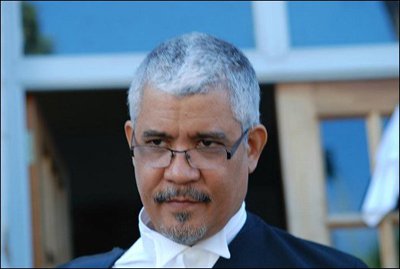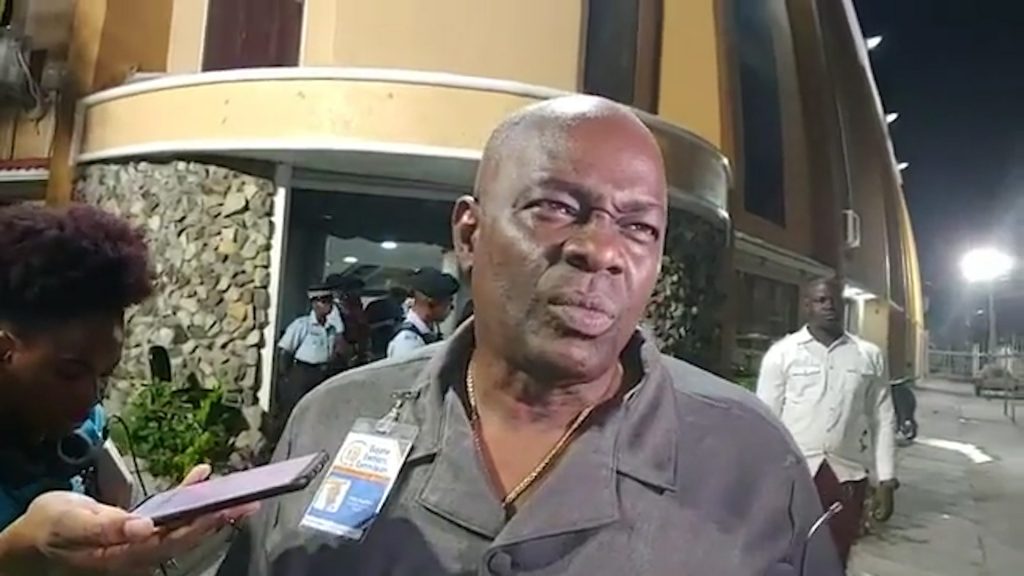Using Mingo’s declaration would reward criminality, undermine democracy – High Court told
For the High Court to set aside the national vote recount and direct the use of figures proven to be fraudulent would be downright offensive, reward criminality, violate the constitutional rights of citizens to choose their representatives and perpetuate the gravest of injustices.
This was the argument of the Opposition Leader Bharrat Jagdeo and PPP Presidential Candidate Irfaan Ali in the case before the High Court seeking to quash the national vote recount.
The applicant, Misenga Jones, an agent of President David Granger’s APNU+AFC Coalition, wants the Court to command the Guyana Elections Commission (GECOM) to use a report submitted by Chief Elections Officer Keith Lowenfield which contains District Four figures from Returning Officer Clairmont Mingo.
“Giving effect to Mingo’s declaration would allow Mingo, and not the people, to decide who should govern Guyana,” Senior Counsel Douglas Mendes, representing Jagdeo and Ali, stated in his written submission to Chief Justice Roxane George. Oral arguments were held virtually Friday.

The declaration made by Mingo has been proved conclusively to be fraudulent and gives APNU+AFC more votes than were cast for it by the electorate, Senior Counsel Mendes argued.
Mendes said the Chief Elections Officer is not bound and would indeed be acting unlawfully if he were to act on that declaration.
Likewise, in the face of this uncontroverted evidence of Mingo’s botched figures, GECOM would be acting unlawfully and in violation of the electorate’s constitutional right to vote and to representatives of their choice, if it gave effect to Mingo’s fraudulent declaration and returned a party which the electorate had rejected, Mendes contended.
“This Court would also be facilitating an illegality if it were to make any order which effectuates the Mingo declaration,” Mendes added.
He said that because Article 9 of the Constitution declares that “sovereignty belongs to the people, who exercise it through their representatives…” and that “sovereignty does not belong to Mingo.”
“Simply put, Mingo’s declaration is unconstitutional and unlawful. GECOM would itself be acting unlawfully if it were to give effect to his declaration,” Mendes declared.
He added that to invalidate the recount would plainly cause substantial hardship and substantially prejudice the rights of the majority of the electorate who voted in favour of the PPP and would be detrimental to good administration.
The complaints made by the applicant, Mendes argued, should be addressed in an elections petition after the true winners of the elections are declared on the basis of the figures generated in the national vote recount.

The Chief Elections Officer, through his attorney Senior Counsel Neil Boston, argued that the purpose of the legal order to allow for the recount was to correct the dispute that arose between the political parties and the figures reflected in the declaration made by Mingo.
The order, deemed subsidiary legislation, was made on May 4. The recount began on May 6 and lasted for 34 days. Boston argued that the Order was in excess of the power under which it is made.
“It is respectfully submitted that GECOM cannot by a subsidiary legislation gives itself the power to resolve elections disputes that arise in the course of an election which said disputes the Constitution has placed in the exclusive jurisdiction of the Election Court,” Boston argued.
Trinidadian Senior Counsel John Jeremie, attorney for the applicant, argued that Section 22 of the Elections Laws (Amendment) Act is unconstitutional and the recount Order 60 is invalid, null, void and of no effect.
But the Court of Appeal, in a recent judgment in a case brought by Ulita Moore, a candidate for APNU+AFC, Justices Dawn Gregory-Barnes and Brassington Reynolds rejected the argument that Section 22 of the Election Laws (Amendment) Act was unconstitutional and held further that “the order was not an unconstitutional order”.
The Chief Justice retorted that as a court of the first instance, she would be bound by the higher court.
Mendes pointed out “the supreme irony” of the Applicant’s position – that the matters are meant for an election petition.
Nevertheless, the Applicant goes on to state that the Order unconstitutionally establishes “a dispute resolution process” that is contrary to the Representative of the People Act which excluded the statutory officers, that is to say, the Returning Officers from the recount process and declaration of the counts.
The Applicant claimed that the recount order cannot bring about “a new legal regime” as the basis of the declaration of votes.

The Applicant claimed that under the Representation of the People Act there is a clear process set out for the declaration of results by the Returning Officers under section 84 with which the Chief Elections Officer must comply. As such, the Applicant argued that GECOM cannot unilaterally invalidate the declarations since that is something only an Election Court can do under Article 163.
Since she submitted that Order 60 is unlawful, the result obtained therefrom are invalid and no declaration, based on that recount, can lawfully be based on the said recount results.
Mendes argued that these submissions are misconceived.
He said that the recount order was made against the backdrop of requests being made for recounts in a number of electoral districts which were rejected, aborted or held in abeyance.
It was also made against the backdrop of an agreement made by all contesting parties for a total recount of all electoral districts “as a means of assuaging the contesting parties and determining a final credible count.”
Mendes pointed out that the request for a recount in District Four was rejected by the notorious Mingo.
What GECOM did in this instance by ordering the recount was merely, in effect, to waive compliance with the strict procedural provisions of the Representation of the People Act.
The substance of the recount was to consist of the counting of the ballots. It was to be done under the supervision of the Chief Elections Officer and other GECOM agents.
But the brunt of the provisions in the Order dealt with the procedure which was to be followed for the transparent recording of the votes counted. The procedure was different from that which is required under the Representation of the People Act, but the substance was the same: to count the ballots and this was done with the full agreement of all stakeholders in the elections.
Furthermore, what GECOM required to be done by its Order was the ascertainment of the true will of the electorate by the actual physical counting of the ballots. If not in accord with the letter of the Representation of the People Act, the Order gave effect to its spirit and established no new election regime.
He noted that the facility of invoking a recount is an important statutory safeguard against error in the tabulation process and in the event that that process is conducted for an improper and illegal purpose.
“As a result of the recount, the public would be assured that the actual winner was declared by a recount of the actual ballots cast.
“The purpose of the Act is to carry out the democratic will of the people.
“There is no surer way of achieving that purpose than by recounting the actual ballots,” Mendes argued.
In any event, Mendes cited the recent judgment of the Caribbean Court of Justice (CCJ) which stated that the order was “to provide an open, transparent, and accountable recount of all votes cast in those elections”, “to assuage the contestations among the various parties …” and to “remove certain difficulties or fill certain gaps in connection with the application of the provisions” of the Representation of the People Act.
Mendes, therefore, argued that if the recount carried out under Order 60 is valid, then the previous declarations have been superseded and cannot be acted on.
He said the major distinguishing factor between the recount and the declarations is the results in relation to District Four.
Whether the recount was validly ordered or not, the fact is that the ballots in each of the polling stations in District Four have been recounted under a process which the CCJ has described as open, transparent and accountable.
Mendes submitted that there is no evidence that the recount of the ballots in District Four is inaccurate.
That recount shows that the APNU+AFC received 116,403 votes. On the other hand, Mingo’s declaration shows that the APNU+AFC received 136,057 votes.
It is now plain beyond any doubt that Mingo corruptly gave the APNU+AFC 19,116 more votes than were actually cast for that party’s list.
Mendes argues that if Mingo’s declaration is to be acted upon and the court accedes to the Applicant’s request to grant relief requiring the Mingo declaration to be given effect, then the court would: be furthering and facilitating the commission of an unlawful act and the rights of the majority of the electors to representatives of their choice would be infringed.
Further, Mendes argued that if Mingo’s declaration were to be used, the will of the majority of electors who wished to install the PPP as their government would be frustrated and the constitutional right to representative democracy would be undermined.
He emphasised that were effect to be given to the 19,116 votes which were not cast for APNU+AFC but which Mingo allocated to APNU+AFC, it would deny the right to vote to those citizens who voted the PPP into office and would undermine the founding principle of the Guyana Constitution that it is the people who must decide who should govern them.







It seems all they do in Guyana the APNU and their followers and corrupt officials is trying to change the results of elections where they lost by 15,000 votes and the rights of the people using corrupt numbers to win by default. Cannot remember history where people who lost like hell use hundreds of ways to stay in power fortunately they have not yet use the army and police as there instruments of power. Mingo and Lowenfield are one of the most corrupted officials in history and take pride in showing this is what I shall do regardless if it screwed all the people. The Govt of Granger and his all his ministers and MP’s and party don’t want to give up power and has already screwed the democracy of Guyana for years to come.
If it was the PPP/Civic that lost they would have renounce power on the results of the recount rather than stay in power like cowards with no dignity or integrity and purely trying to rewrite history and disgrace the people and democracy in Guyana. Any leader that do such things is power-hungry dictators who hate to lose and are power-grabbing dictators.Mr. Granger is like some of his buddies Burnham, Amin, Mugabe, and Maduro, and even despotic like Hilter Stalin and others in history. All the international organizations have already mentioned and establish he should exit power but he believes he is greater than all men and powers to be using the court as much as he can to see if he can twist the hands of corrupted officials to give him a victory. He is not a leader a complete coward a joke and a tinpot dictator and democracy in Guyana are again at its crossword because of these strongmen.